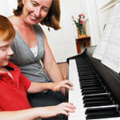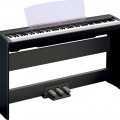 Taking adult piano lessons is really not much different from learning in childhood. But there are two outstanding exceptions that distinguish adult students from child students. In this article, drawing on my experience as a teacher of adult piano students ages 18-70, I offer some tips about time management and practice that are by far the most important and common challenges unique to adult music students. These factors are what adults should take into consideration before deciding to learn how to play an instrument.
Taking adult piano lessons is really not much different from learning in childhood. But there are two outstanding exceptions that distinguish adult students from child students. In this article, drawing on my experience as a teacher of adult piano students ages 18-70, I offer some tips about time management and practice that are by far the most important and common challenges unique to adult music students. These factors are what adults should take into consideration before deciding to learn how to play an instrument.
There is a widely held belief that music lessons must begin at an early age, and that starting later in life puts one at a serious disadvantage. Researchers in various early childhood education disciplines, including music, consistently emphasize the benefits that music lessons have for developing life skills that are vital to social and cognitive development. But as for learning to play an instrument, adults seem to be no slower in their progress regardless of age, as they often fear (except for some obvious factors of advanced aging such as Alzheimer’s or dementia).
Adult students are typically very passionate about learning, which is normally a strong predictor of success across all age groups. So, how early you begin learning to play an instrument is not nearly as important to your ability to learn now.
Adult students enjoy just as much progress as any child student, as long as they can manage two challenges unique to being an adult student.
Time Management
As an adult pianist and a teacher of adult piano lessons, I can attest to the challenges we all face in carving time out of our daily routine for regular practice. As adults, many of us have found ourselves living most of our daily lives in a reactionary mode rather than a proactive state of mind. Our hectic professional and personal lives easily preclude us from spending time on personal goals, including instrument practice. Therefore, for adults, the only requirement other than having an adequate instrument and books, and a good teacher, is having strong time management skills.
Once you are able to set aside a half-hour to an hour of consecutive daily practice for at least three to five days a week (ideally a total of at least five days a week total in any case), you will be well-prepared to start taking adult piano lessons where you will notice improvement almost immediately. This consistency is important because repetition and consistency is vital to establishing a strong and healthy technique.
But motor memory, while it is the quickest and easiest way to memorize, it is also the least tenable form of memory, and skipping days of practice will force you to backtrack and repair holes in your progress, especially for something that is new to you (virtually anything that you have not practiced for at about 3-5 consecutive days in a row). The consistency of daily practice has a strong effect on the learning and enjoyment of playing. This repetition is a wonderfully simple reality of practice – most experienced pianists agree that a lot of repetition and practice time is essential. Famous concert pianists including Rudolf Serkin, Heinrich Gebhard, and Percy Grainger referred to the brunt of their performance relying on “automatic” and “non-mental” repetition, then go on to describe more conceptual memorization strategies (IE those involving an understanding of musical theory, harmony, and form) as a kind of backup plan or tool for long term development of general memorization skills (Chaffin, et. al. Practicing Perfection: Memory and Piano Performance, pub. Lawrence Erlbaum, 2002. p. 36). In my experience, the loss of continuity due to skipping practice is the most common reason adults quit their piano lessons. It is often due to an inability to set aside the time, or sometimes to being too impatient about taking the time to master a concept before advancing to another, that adults quit lessons. This leads to the next question almost all adult students have once they have actually begun learning piano.
Conceptualization
While children absorb information like a sponge, we adults tend to over-complicate things. But simplicity is the key to facilitating learning. This leads me to answering the question that nearly every adult student has once they have established a steady practice schedule: Should I be thinking anything in particular, or just automatically repeating this?
In my experience, as described by all of my teachers and cohorts, and as described by the aforementioned concert artists, the answer is surely more repetition than thinking. Trying to inject extra ideas into an exercise requires extraneous effort that distracts us from the repetition required to master a concept. A common frustration that adults experience in adult piano lessons is spending too much time conceptualizing their practice, or trying to learn new concepts, without isolating and repeating them enough to retain them.
 A good guideline to follow is to pick music in your method book that takes no more than one to two weeks to learn, and follow the directions of practice in the method book. Do not anticipate and over-conceptualize the purpose of the exercise or piece. Instead, feed your automatic memory the new concept until you can play the piece at the recommended tempo. The method book and teacher will show you what to learn next. After all, method books and teachers are here to simplify the process of learning – simplification is what makes practicing successful.
A good guideline to follow is to pick music in your method book that takes no more than one to two weeks to learn, and follow the directions of practice in the method book. Do not anticipate and over-conceptualize the purpose of the exercise or piece. Instead, feed your automatic memory the new concept until you can play the piece at the recommended tempo. The method book and teacher will show you what to learn next. After all, method books and teachers are here to simplify the process of learning – simplification is what makes practicing successful.
As long as you can plan to maintain a consistent practice schedule and pace yourself appropriately, you will love learning to play piano. Adults are not much different from children in their success with piano lessons, as long as they follow the two guidelines listed above for adult piano lessons. Learning to play an instrument is a rewarding part of our development at any time in our life.







I have always been interested in learning how to play a musical instrument, but for some reason, I’ve just never buckled down and done it. However, I have a goal to learn to play the piano this year, so I am determined to do it! I appreciate how you point out that it is necessary to set aside a half-hour of consecutive practice at least 3 to 5 days a week. I’ll be sure to apply that so that I can learn as much as possible!
Hey Jen,
Yes! Finding a consistent practice schedule is one of the most important components to taking lessons. Your teacher can take you very far and guide you towards your goals, but at the end of the day it’s the student who puts in the work. With motivation and daily practice you’ll be sure to see positive results!
I am currently taking piano lessons as an adult, and I am loving it. It's really not a big deal. I don't even have a piano to practice on and I am moving ahead beautifully. I work at a school, and I play the piano there 15 minutes twice a week. When I am proficient in piano, I'd like to take harp lessons.
Piano classes are for children who want to learn music and how to play the piano but that is not all! Piano classes bring with it other benefits than only mere learning for your little Mozart. Piano lessons help in the development of cognitive faculties, enhancement of social skills and bring in open mindedness in the child’s character. The children learning and playing pianos do not only develop cognitive faculties which make scholastic achievement and learning processes easier. The child can develop a capacity for discipline which can aid the process of learning furthermore.